Menu
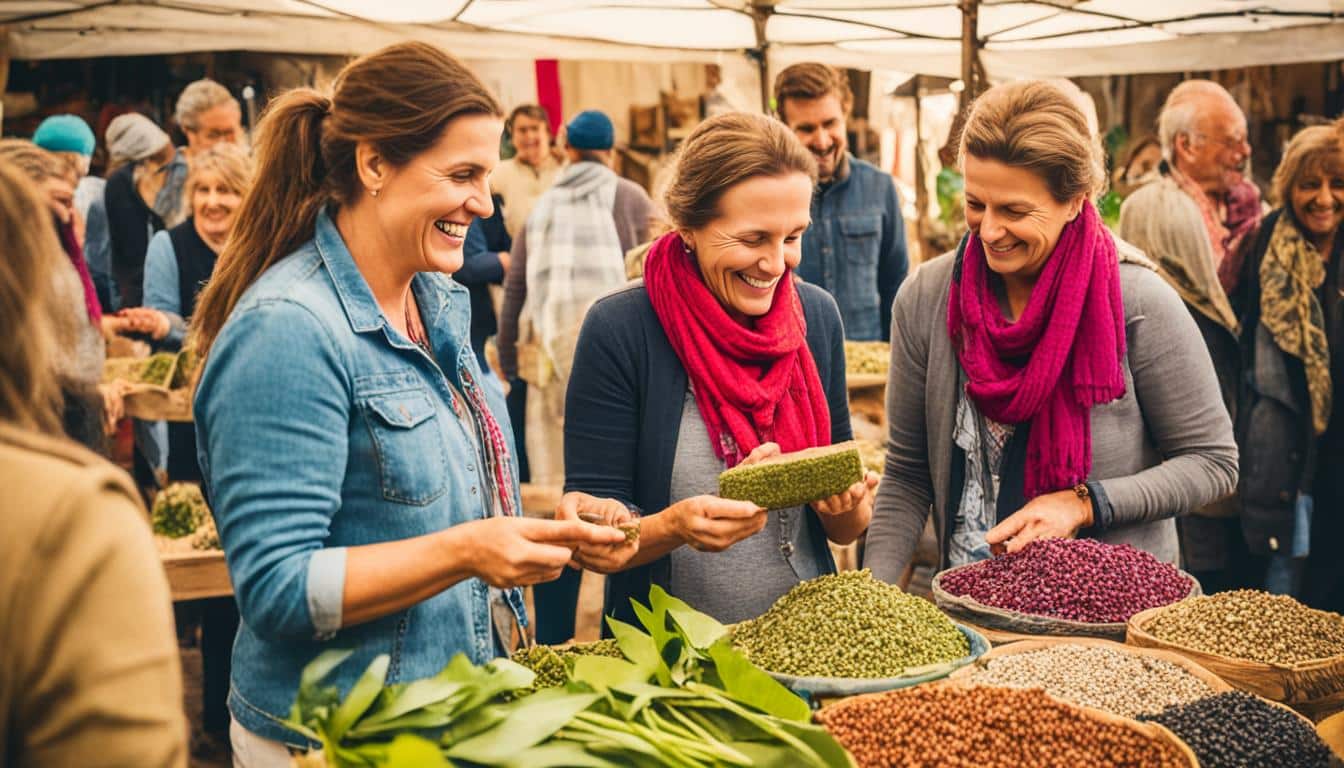
The Fair Trade Practices Program has four key parts to keep it running smoothly. These parts cover things like how food is labelled and the work of certain businesses. They aim to make sure trade is fair for everyone around the world. People started thinking this way in the 1940s, wanting to make trade equal and good for all. Now, millions of people work together for a trade system that’s not only fair but also kind to our planet and its people.
Fair trade is about more than just the price of things. It means making sure that the people who grow or make products earn a fair wage. It also looks after their rights and makes sure no one is using children to do this work. This way of trading protects the environment too. Together, these efforts make sure everyone, from the farmers to the shoppers, has a better deal.
Fair trade is all about justice, fairness, and respect. It works for a better world by standing up for what’s right in business. Its aim is to make sure everyone gets a fair wage for what they do, works in safe conditions, and looks after the environment.
Fair trade believes in empowering people through fairness and sustainability. It works with millions of farmers and workers from 70 countries. With over 1,900 producer groups, it ensures fair prices and fights against low wages and unfair trade.
This approach helps farmers improve their farming while protecting the environment. Over the years, fair trade has become a global force for good business, thanks to clear rules and checks by groups like FLOCERT.
Fair trade began to fight the problems farmers in poorer countries faced. It was a response to the unfair treatment they got in the global market. Now, after many years, it stands strong, demanding ethical business conduct worldwide.
Many heroes have worked hard, right from the ground to the top, to support fair trade. They have managed to make changes, like better trade rules for farmers and help for those hit by plant diseases. Notably, half of the voices involved in fair trade come from the farmers and producers themselves.
Fairtrade’s social premium has improved life for many, with new schools and better health care. This premium comes from people choosing fair trade products, knowing their choice helps others. Such support shows that business can be good for everyone, not just for making profits.
Fair trade is crucial for good business ethics. It helps companies work well with society. By sticking to fair trade rules, businesses can show they’re socially responsible. This means they care about helping the economy and protecting the environment.
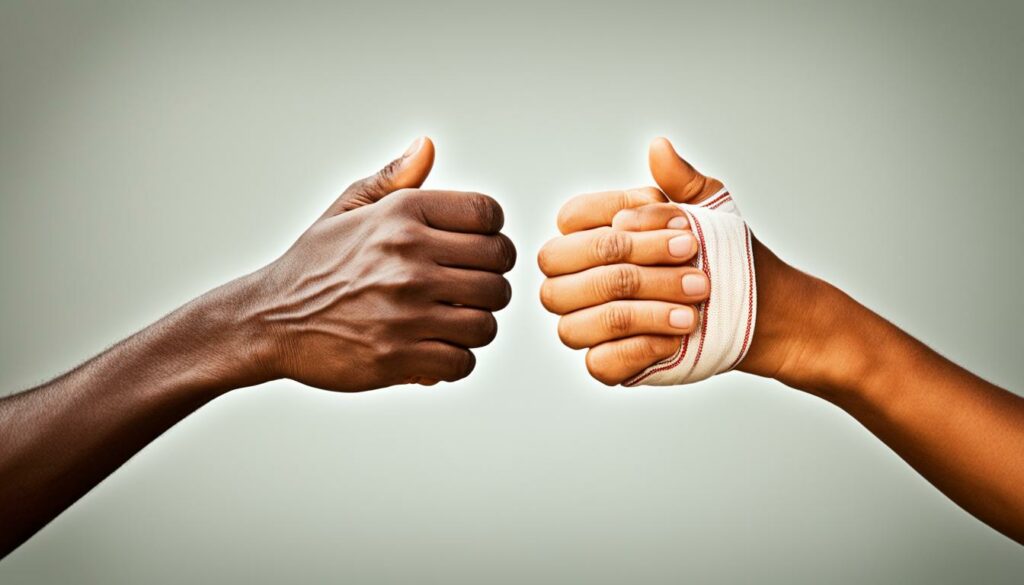
Fair trade makes sure businesses do good for the world. It values buying ethically and treating everyone fairly. For example, Impact Mart gives 30% of its sales to help make things more equal. This shows how companies can make a big difference. In the coffee industry, fair trade has helped small farmers live better and farm in ways that don’t harm the earth.
Fair trade helps economies grow by making sure business deals are fair and help communities grow. Getting a fair trade label means products were made and sold fairly. It has made a big impact globally, with 33% more people and groups supporting it. This helps with big plans like the UN’s to end poverty and make the world more equal.
Fair trade is key for taking care of the planet. It looks at how things are made and their impact. By supporting fair trade, you help keep places clean and protect jobs of those crafting beautiful things. This way, we help keep traditions alive while looking after our world. It’s a team effort that has a good environmental effect.
| Aspect | Fair Trade Contribution |
|---|---|
| Social Responsibility | Support for community projects and ethical sourcing. |
| Economic Growth | Fair pricing, labour conditions, and global recognition. |
| Environmental Sustainability | Eco-friendly production and preservation of cultural heritage. |
Fair trade certification and labelling are crucial for checking ethical standards. They make sure products come from sources that care about people and the planet. This lets consumers choose products that are made the right way, impacting how they shop and trust what they buy.
Many organisations look after fair trade standards. Fair Trade USA works with lots of brands and producers, about 1,500 in all. They help keep trust in products strong by checking that they’re made ethically.
| Certification Body | Key Indicators |
|---|---|
| Fair Trade USA | Partnerships with 1,500+ brands, fair wages, community development |
| Fairtrade International | Minimum price guarantees, safe working conditions, sustainable practices |
| Global Organic Textile Standard (GOTS) | Environmental criteria, chemical usage restrictions, social criteria |
Fair Trade Certified labels are a mark of quality and ethics. They’re found on things like coffee, clothes, and fruit. These labels promise fair pay, safe work, and the chance to trace where products come from. More and more, shoppers want to buy things they feel good about, making these labels ever more important.
Fair trade isn’t just about buying and selling. It brings many benefits to the people making things and those buying them. For producers, it means they have more say in the market. It helps improve their economic future too.
Fair trade ensures farmers and workers get paid fairly. The Fairtrade Minimum Price protects them for products like cocoa, coffee, and bananas. This makes income steadier and lowers their risk of falling into poverty.
With 50% say in Fairtrade’s workings, producers can speak for themselves better. This stronger position helps them in negotiations. It means they can demand a fairer deal in the marketplace.
Cooperatives are a big part of fair trade. They help communities work together for better prices. This way, small farmers can get a bigger piece of the pie compared to selling on their own.
Additionally, through the Fairtrade Premium, farmers get extra money to improve their farms and their communities. This extra cash can go towards better farming methods, like going organic. It also means they get to reach more customers, selling in higher-end markets.
| Fair Trade Enhancements | Impact on Farmers |
|---|---|
| Fairtrade Minimum Price | Increased income security, reduced poverty |
| Fairtrade Premium | Investment in farming practices, stronger cooperatives |
| Cooperatives Formation | Enhanced negotiating power, higher product prices |
| Access to Premium Markets | Improved sales and farming practices |
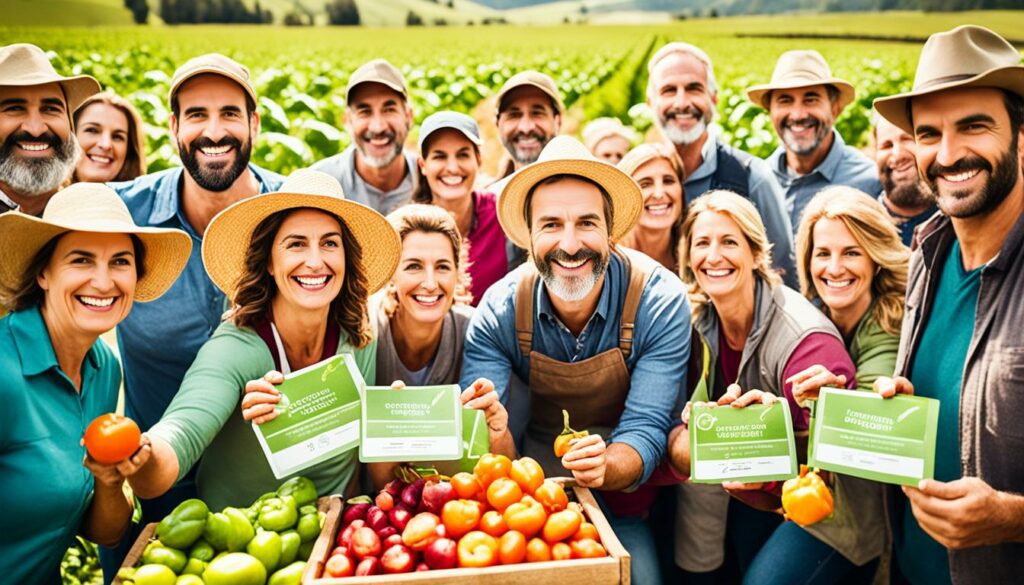
Consumers also win with fair trade. They get products that meet high ethical and environmental standards. Buying fair trade lets consumers make choices that match their values. This creates mutual trust between producers and buyers.
Choosing Fair Trade-labelled products supports key values. This includes respect, fair pay, safe working conditions, equal rights for all, and helping small producers. These choices push for positive changes to end poverty and exploitation in producing countries.
It’s a win-win situation. Fair trade’s mutual benefits show the value of supporting these practices. It’s about being part of a bigger effort for social fairness and economic justice worldwide.
Fair trade is a key part of making supply chains sustainable. It adds ethical rules to how products are made and sold. This means looking out for the environment and making sure workers are treated well. Lots of good things happen because of fair trade for both the people making the products and those buying them.
Fair trade changes how supply chains work for the better. It makes everything clearer and fairer. This way, businesses get stronger with better leadership and rules. Fair trade also makes sure workers are treated right, making their jobs safer and building more trust.
“Fairtrade promotes environmental protection and climate change adaptation, leading to environmentally sustainable production practices among farmers and labour setups.”
It makes the supply chain strong against market changes and unfair treatment. And there’s the Fairtrade Premium. This extra money helps farmers and workers improve their communities. They can get better services and buildings.
Fair trade means thinking about the future, not just making money now. It helps the environment and helps communities keep getting better. For farmers, it means growing better crops and having a stable way to sell them.
Many Fairtrade workers are women. That’s about 350,000 of them. Giving women fair opportunities is important for supply chains that can last. They do a lot of work that keeps everything going.
Fairtrade works hard to stop cutting down forests for coffee. Now, the rules are even stronger because of the Fairtrade Climate Standard. Both Fairtrade International and the Gold Standard are working together for this.
| Key Aspect | Impact |
|---|---|
| Standard of Living | Improved for farmers and workers, reducing price volatility vulnerability |
| Business Strength | Stronger businesses through democratic leadership and transparent accounting |
| Workers’ Rights | Protection of basic rights, safe environments, and prohibition of forced labour |
| Environmental Protection | Promotion of sustainable practices and climate change adaptation |
| Community Investment | Enhanced through Fairtrade Premium, enabling access to essential services |
Fair trade is about keeping things good for the long run. It invests in both people and the planet, making sure everyone can thrive. It’s part of a big effort to keep the world sustainable for the future.
Ethical sourcing under fair trade means we value everyone’s work. It focuses on giving fair pay and safe work areas. This helps workers while also boosting business.
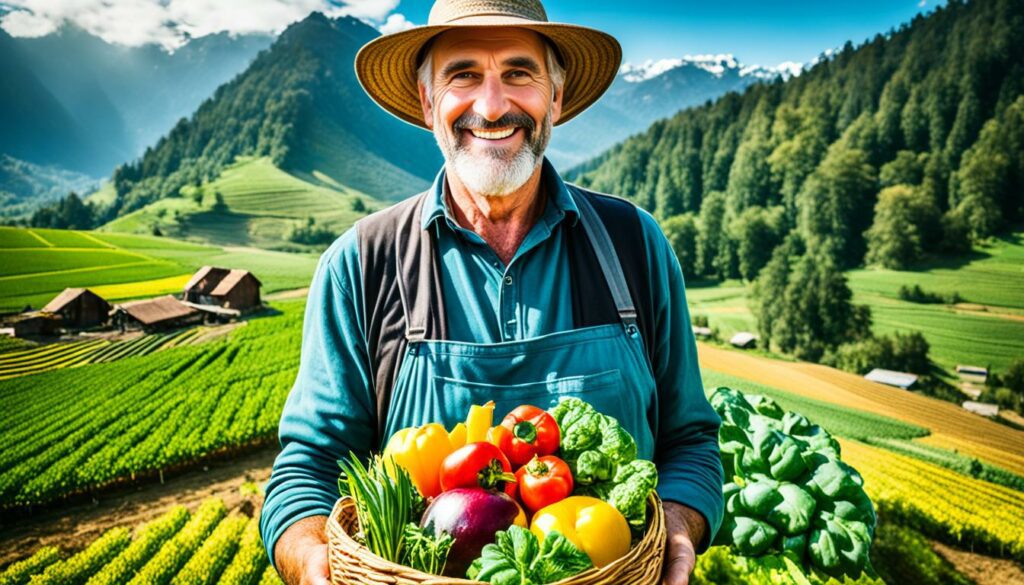
In 2012, Starbucks led by example. They got 93% of their coffee from places like C.A.F.E. Practices and Fairtrade. This guaranteed workers fair pay and a good place to work. Starbucks also spent over $70 million to help farmers, showing their deep ethical commitment.
Fair wages are key in ethical sourcing. It’s about people getting paid right for what they make. Starbucks aimed for all their coffee to be ethically sourced by 2015. This push was to spread the benefits evenly, improving farmers’ lives.
Having safe workplaces is crucial. For example, Tea estates in 2012 committed to safe and secure work areas. Also, partnerships like CHAI, reaching India and Guatemala, show big health improvements. They do this by focusing on safe work atmospheres.
The impact is felt widely. In 2012, Starbucks put $15.9 million into farmer loans, with plans to reach $20 million by 2015. This push not only ensures safer work but also helps farmers use resources better.
Ethical sourcing is about more than just buying things ethically. It’s about honouring workers at the start of the product chain. By doing so, the path from where products start to where they’re used shows respect, fairness, and care.
Corporate social responsibility (CSR) shows how businesses care about the planet and people. It’s about sticking to good practices over time. Fair trade helps businesses focus on being good for the world, society, and their workers. It’s been proven by looking at work in Finland and Pakistan. This shows fair trade must be at the heart of being a responsible business, not just an extra.
Being ethical in business is crucial today. Fair trade products mean a company uses safe and ethical ways to make things. This leads to safe jobs and things that protect the environment. So, by choosing fair trade, companies show they think about their workers and the world. This is a big part of being a responsible business.
How people see a brand is more and more about the good it does. Choosing fair trade makes a company more trusted and liked by customers. Research proves that when a brand is serious about being ethical, people want to buy from it. This way, companies that follow fair trade support everyone in their supply chain. This means helping those who make the products and those who buy them.
| Key Advantages of Fair Trade in CSR | Explanation |
|---|---|
| Economic Stability | Fair trade makes sure producers earn fairly, helping them and their communities live better. |
| Social Empowerment | It helps towns grow by investing in schools, houses, and healthcare. |
| Environmental Protection | It encourages farming that’s kind to nature, which helps fight climate change and saves species. |
When businesses lead in ethical trading, they earn trust and respect. Fair trade in their CSR work shows they care about everyone. This includes their staff and the environment. It enriches the overall culture of how business should be done. This is important for achieving long-lasting success.
Fair trade faces its own set of challenges, despite being honourable. It has been critiqued for its weak impact on farmers economically. The FairTrade International report in 2015-2016 found that it gives farmers less than $0.04 a day. This calls into question the real effect of fair trade on improving the lives of producers.
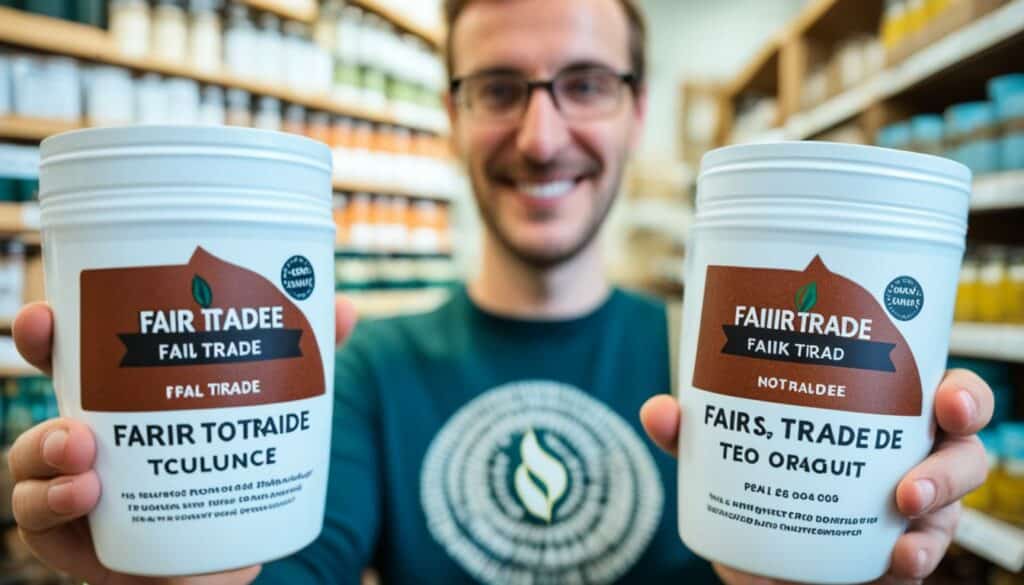
Market accessibility is another big issue. Just 28% of Fair Trade coffee from 2013-2014 reached its markets, showing a gap between supply and demand. High prices of Fair Trade products block their access to lower-income consumers. This further restrains their market growth.
Fair Trade USA sets a minimum price for coffee, which can lead to products being overpriced. This could create trade barriers if the quality doesn’t match the cost. Also, the global market’s lack of transparency makes following Fair Trade rules harder. It adds extra limits to fair and ethical trades.
Within Fair Trade, there are also internal criticisms. The premium money often ends up controlled by major cooperatives. This means the money might not reach smaller farmers, highlighting a deeper issue with fair trade’s impact being too shallow.
The challenges Fair Trade meets also depend on how consumers behave. Many people prioritise cheap prices over ethical considerations. This makes it hard for Fair Trade items to be more popular. Changing this asks for more awareness and a culture that values ethical trades.
“The notion that Fair Trade is a transformative force must be balanced against its practical shortcomings and challenges in scaling impact.” – Fair World Project
The Fair World Project is trying to make a difference. By sending 1,500 letters to big brands for sourcing Fair Trade ingredients, they are fighting for change. Their work shows the urgent need for a fairer and clearer way of making and selling Fair Trade products.
| Issue | Description |
|---|---|
| Economic Impact | Less than $0.04 per person per day for farmers and growers. |
| Market Accessibility | Only 28% of Fair Trade coffee was sold in Fair Trade markets (2013-2014). |
| Premium Pricing | High prices make Fair Trade products unaffordable for lower-income households. |
| Price Regulation | Fair Trade USA’s price floor can lead to overpricing issues. |
| Transparency | Lack of transparency hinders meeting Fair Trade standards. |
| Revenue Distribution | Large cooperatives control Fair Trade premium, leading to uneven revenue distribution. |
In spite of these challenges, Fair Trade is working towards genuine and wide-reaching change. It aims to go beyond surface actions and limited markets. For that, focusing on better and more transparent practices in the Fair Trade system is key. This is crucial for making ethical trade more normal everywhere.
Fair trade practices have come a long way, becoming a common sight from a rare find. This change is thanks to the support for trade that’s ethical. It lets those who make goods earn a fair living and helps poor communities. This isn’t just talk. It’s about making real changes, like in coffee and fabrics. This helps improve workers’ lives and the conditions they work in.
The fair trade movement relies on certifications. These tell consumers that products are made in the right way. This kind of guarantee is key for people who want to do the right thing, as they choose products made the right way. It takes governments, businesses, and groups working together to make this idea a big part of how we trade globally.
Fair trade rules push for farming that respects the environment and helps the planet. They’re also key to meeting big goals for the world, like good pay for all, equal rights, and caring for the Earth. Yet, the quest for lower prices can hide this good work. So, we need to talk more about why fair trade is important for everyone.
It’s a team effort to make fair trade a common choice. Manufacturers, sellers, and buyers all play a part. By always choosing fair trade, we’re building a trade system that’s fair to all. This kind of system looks after people, the economy, and the planet.
Fair trade has really grown in recent times. This is all thanks to more people in new markets joining in and the use of new technology. There is a big demand for products that are made the right way. That’s changing the way fair trade works and grows.
New markets are becoming key places for fair trade. They are helping many people earn more and improving local economies. Half of people in a recent study said they are now buying items to help various causes. Also, over a quarter say they look for products that are friendly to the environment. This interest has greatly increased over the last 14 years.
Technology is changing the fair trade game. It’s making things clear, more efficient, and connecting producers directly with buyers. This means more than 70% of shoppers want to know exactly where their products come from. They’re even willing to spend more on brands that are open and upfront. The US saw a big 32.4% jump in online shopping in 2020, spending nearly $792 billion. This shows just how important technology is for fair trade.
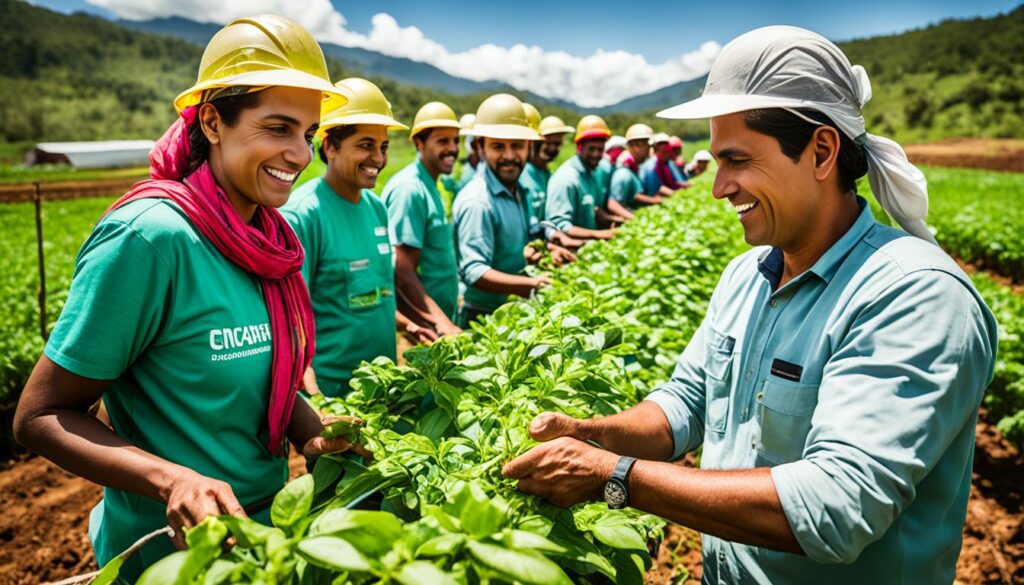
This tech is also helping farmers do a better job. They’re getting fairer deals than they would in regular markets. For example, over $218 million was put into farming communities in 2020. This was all thanks to the use of technology. It’s clear that tech and fair trade are a great team. Together, they are driving big changes and hope for the future.
The fair trade movement’s power shines through its real-life successes. Looking at stories in the coffee and crafts fields, we see the big impact of fair trade. It changes communities and industries for the better.
Fair trade has changed the coffee sector significantly. Over 400 businesses are now part of the Fairtrade movement. CRU Kafe is battling climate change by helping coffee farmers. And Grumpy Mule‘s farmers have used their extra earnings to make their coffee better in quality.
Cafédirect mixes direct and fair trade to help farmers in Africa, Latin America, and Asia. Meanwhile, LEON serves organic, Fairtrade coffee that supports the World Land Trust. Thanks to fair trade, coffee farmers get fairer prices, work under better conditions, and help their communities more. These stories show how fair trade boosts the coffee industry.
Fair trade does more than just coffee. It also helps keep cultural crafts alive and helps artisans’ communities grow. For over 70 years, Ten Thousand Villages has been supporting artisans. They promote cultural preservation and ensure fair pay, all while building long-lasting partnerships.
In India, makers of crafts have seen their work and communities improve. Efforts like Divine Chocolate, a company co-owned by Ghanaian cocoa farmers, are making a difference. They put profits back into the farmers’ groups and offer them a lot of training. Through connecting buyers with producers, fair trade changes lives and communities. It shows its true worth with stories of these likeable successes.
I support ethical retail practices. I’ve seen how choosing fair trade products can make a big difference. The link between what we buy and what shops sell is vital. It helps fair trade become a normal part of shopping.
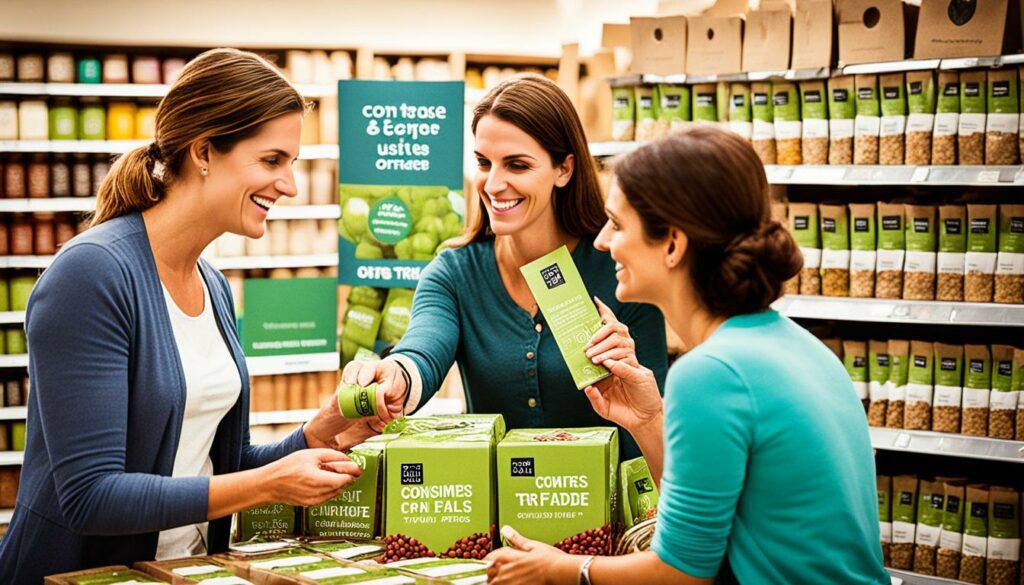
What we choose to buy really matters. By picking fair trade goods, we push for better retail habits. These habits help workers and the planet. Labels showing something is fair trade make us trust the product. But, many people still go for cheap things over ethical ones.
This is where education comes in. If we all learn more about the good that fair trade does, it can change the market. The power isn’t just in one person’s choice. It’s in all of us picking fair trade together.
Shops are noticing we want to buy things that are good for both people and the earth. So, they are choosing more fair trade items. For example, Divine Chocolate gives farmers in Ghana good deals. Ten Thousand Villages helps craftspeople from all over the world sell their products. This supports the idea of ethical retail.
These actions show that shops understand and care about what customers want. This builds a strong connection between shops and us. It helps fair trade grow and makes buying and selling fair products the norm.
| Retailer | Commitment | Consumer Impact |
|---|---|---|
| Divine Chocolate | Fair profits for cocoa farmers | Enhances trust and encourages ethical purchases |
| Ten Thousand Villages | Providing a market for artisans | Supports cultural preservation and socioeconomic progress |
Together, we can change the market and the world economy by choosing ethical goods. Both buying smartly and buying from shops with a good heart matter. We can set fair trade as the gold standard in business worldwide.
Government helps a lot in making trade fairer and more open. It uses laws and public plans to push for ethics in trade. This ensures trading is done ethically.
It is vital to have laws that keep ethical standards high. The Country of Origin Labeling law lets you know where food comes from. This builds trust. The Packers and Stockyards Act helps make sure animal markets are fair. These laws make sure workers and producers are treated well.
The USDA’s program for fair trade has four parts. It involves areas like food labelling and livestock fairness. The program aims to make all aspects of farming trade fairly. It also ensures people know if food is bioengineered. This is done through different labels and symbols to keep things clear.
| Program | Funding/Investment | Impact |
|---|---|---|
| Meat and Poultry Processing Expansion Program | $171 million | Assist 31 small businesses in 23 states |
| Meat and Poultry Inspection Readiness Grant Program | $54.6 million | 278 grants in 45 states |
| Fertilizer Production Expansion Program | $500 million | First round of $29 million in grants |
The support from the government boosts fair trade. It makes sure businesses follow the rules. This helps spread fair trade through the economy. It encourages consumers and traders to be fair.
In our quest to support fair trade, the data shows a bright future. The reports by the CMA on things like bananas, coffee, and cocoa are very hopeful. They cover about 2-3% of Fairtrade producers.
This move is big for making farming greener and having longer supply deals. It’s great to know this won’t mess up the fair market. This way, stores can keep setting fair prices for their goods.
It’s amazing there are over 1,500 partners, like Wholesum and Equator Coffees, on board. Steve Shriver from Eco Lips also backs Fairtrade. This helps workers have better jobs and protects kids from working too young.
Fairtrade is more than just getting a stamp. It’s about ensuring fair pay and safe jobs for all. The future of fair trade is up to us all. Together, we can make a difference. We can build a world where trade is fair, the environment is looked after, and everyone has a chance to do well.
The aim of fair trade is to make global trade more even. It puts the focus on the workers and on saving the planet. This way, fair wages, good working conditions, stronger communities, and the environment are all taken care of.
Fair trade is all about justice, fairness, and respect. It helps workers by paying them fairly and in ways that don’t harm the earth. It’s a way to fight social and economic problems with good business practices.
The 1940s saw the start of fair trade by American thinkers. Today, it has become a worldwide push for doing business right and stopping the abuse of workers in poorer countries.
Being socially responsible is key in fair trade ethics. It asks businesses to help local communities, keep the economy steady, and go green. This supports buying things that are made the right way.
Fair trade boosts economies by paying workers better and improving work sites. It leads to goods made in ways that help everyone and not just a few. This makes for fair deals for whole communities.
Keeping the planet healthy is a top concern in fair trade. It means making things without hurting the earth for the future’s sake. Everyone involved benefits from being green.
Fair Trade International is a big name in setting fair business policies. It checks if makers are following good rules and are being kind to the planet.
Fair trade labels show shoppers that what they’re buying is good and doesn’t harm the earth. They let people shop smart, sticking to values that help communities and nature.
Producers gain a lot from fair trade, like earning more, working in better places, and building up their areas. Buying fair means these positive changes keep happening.
Fair trade to shoppers means quality and trust. It lets them pick products in line with their morals, supporting fairness and openness in trade.
Fair trade changes the way goods move from makers to sellers by making it clear, right, and friendly to the earth. This change keeps things fair for everyone and the planet.
Picking things the ethical way, like in fair trade, makes sure workers are paid right. This supports their lives and helps them stay safe and well.
Fair trade sets rules for work, like they should be safe and treat workers well. It stops bad work ways and values people’s labour.
Fair trade and CSR work to set a good standard in business. They help brands be trusted and liked for real care, showing support for all and a steady earth.
One challenge is when people want cheap things instead of buying ethically. Also, getting approved as fair trade can be hard for smaller makers. Knowing more about this can help fix these issues.
Making fair trade known takes talking, teaching, and pulling everyone in, from shops to individuals to whole countries. This way, fairness in trade is made a big deal everywhere.
New markets and tech are making big chances for fair trade. They bring more clarity, speed, and connection, making fairness in trade reach more people and do more good.
Fair trade coffee has lifted farmers’ lives with bonus pay and local projects. Crafts from fair trade also keep culture and economy strong, proving that being fair can truly change lives.
Shoppers support fair trade by choosing wisely and knowledgeably. Shops play a big part by selling and showcasing goods that are made the ethical way, meeting their client’s values.
By making strong laws and having public plans, governments help keep fair trade in check and protect workers. This makes sure shopping is done wisely and openly, for the good of all.